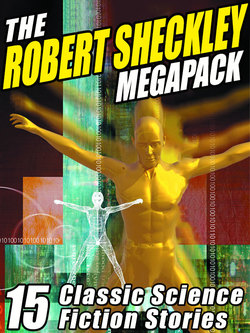Читать книгу The Robert Sheckley Megapack - Robert Sheckley - Страница 5
ОглавлениеINTRODUCTION
“[Robert Sheckley is] probably the best short-story writer during the ’50s to the mid-1960s working in any field.”
— Neil Gaiman
“Robert Sheckley: the best short-story writer the field has produced.”
—Alan Dean Foster
“I had no idea the competition was so terrifyingly good.”
—Douglas Adams
* * * *
ROBERT SHECKLEY (July 16, 1928–December 9, 2005) was a Hugo- and Nebula-nominated American author. First published in the science fiction magazines of the 1950s, his numerous quick-witted stories and novels were famously unpredictable, absurdist, and broadly comical.
Sheckley was a prolific and versatile writer. His works include not only original short stories and novels, but also TV series episodes (Captain Video and His Video Rangers), novelizations of works by others (Babylon 5: A Call to Arms, after the film), stories in shared universes such as Heroes in Hell, and collaborations with other writers. He was best known for his several hundreds of short stories, which he published in book form as well as individually. Typical Sheckley stories include “Bad Medicine” (in which a man is mistakenly treated by a psychotherapy machine intended for Martians), “Protection” (whose protagonist is warned of deadly danger unless he avoids the common activity of “lesnerizing,” a word whose meaning is not explained), and “The Accountant” (in which a family of wizards learns that their son has been taken from them by a more sinister trade—accountancy). In many stories Sheckley speculates about alternative (and usually sinister) social orders, of which a good example is the story “A Ticket to Tranai” (that tells of a sort of Utopia designed for human nature as it actually is, which turns out to have terrible drawbacks).
In the 1990s Sheckley wrote a series of three mystery novels featuring detective Hob Draconian, as well as novels set in the worlds of Star Trek: Deep Space Nine and Alien. Before his death, Sheckley had been commissioned to write an original novel based upon the TV series The Prisoner for Powys Media, but died before completing the manuscript.
His novel Dimension of Miracles is often cited as an influence on Douglas Adams’s The Hitchhiker’s Guide to the Galaxy, although in an interview for Neil Gaiman’s book Don’t Panic: The Official Hitchhiker’s Guide to the Galaxy Companion, Adams said he had not read it until after writing the Guide.
One of Sheckley’s early works, the 1953 Galaxy short story “Seventh Victim,” was the basis for the film The 10th Victim, also known by the original Italian title La decima vittima. The film starred Marcello Mastroianni and Ursula Andress. A novelization of the film, also written by Sheckley, was published in 1966. The story may also have been the inspiration for the role-playing game Assassin. The Japanese novel and film Battle Royale and the series of best-selling novels The Hunger Games also have the same premise as Sheckley’s story. The satirical premise, invented by Sheckley, is that in the future killings are legal and televised, and that potential victims or hunters can get corporate sponsors and extra perks to assist them in succeeding as a professional, corporate-sponsored, celebrity killer.
Sheckley’s novel Immortality, Inc.—about a world in which the afterlife could be obtained via a scientific process—was very loosely adapted into a film, the 1992 Freejack, starring Mick Jagger, Emilio Estevez, Rene Russo, and Anthony Hopkins.
The short story “Watchbird” (included here) was adapted for the short-lived TV series Masters of Science Fiction. It did not initially air in the US, but on February 12, 2012, the Science Channel began airing the episodes, under the title Stephen Hawking’s Sci-Fi Masters, beginning with the first domestic airing of the episode “Watchbirds.” It was included on the DVD set for the series.
A number of Sheckley’s works, both as Sheckley and as Finn O’Donnevan, were also adapted for the radio show X Minus One in the late 1950s, including the above-mentioned “Seventh Victim,” “Bad Medicine” and “Protection.” The radio show Tales of Tomorrow (also in the late 1950s) did a version of “Watchbird,” and South Africa radio did their version of “Watchbird” on the series SF68.
He was named Author Emeritus by the Science Fiction and Fantasy Writers of America in 2001.
